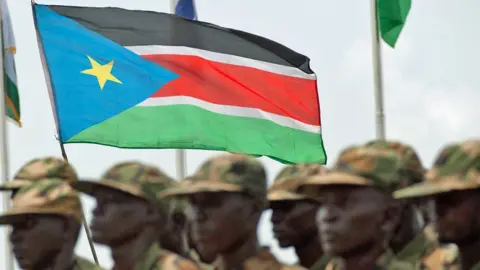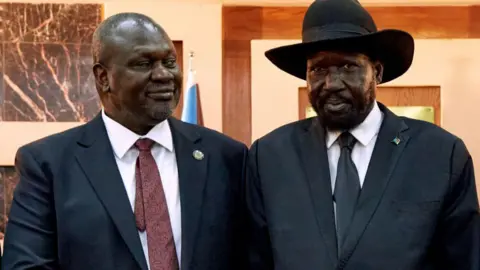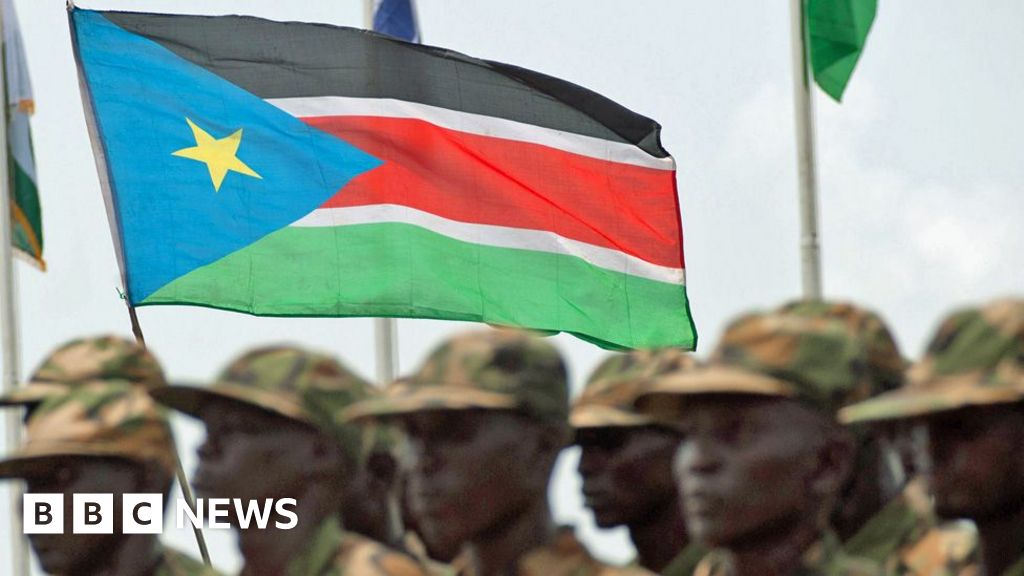Farouk Chothia,
Yemisi Adegoke and
Nichola MandilJuba
 AFP/Getty Images
AFP/Getty ImagesFears that South Sudan – the world’s youngest nation – could plunge into a new civil war have intensified after the party of suspended Vice-President Riek Machar called for “regime change”.
The call came after Machar – currently under house arrest – was charged with murder, treason and crimes against humanity.
His party, the Sudan People’s Liberation Movement In Opposition (SPLM-IO), has denounced he charges as a “political witch-hunt” to “dismantle” a 2018 peace accord that ended a five-year civil war.
Meanwhile, extra troops from neighbouring Ugandan have been deployed to South Sudan’s capital, Juba, as tensions escalate.
The latest crisis comes as a UN report has accused South Sudanese officials of stealing billions of dollars in oil revenues, leaving millions of people without essential services and fuelling the deadly conflict.
What’s the background?
South Sudan, one of the world’s poorest countries, gained independence from Sudan in 2011 after decades of struggle led by the Sudan People’s Liberation Movement (SPLM) under President Salva Kiir.
Just two years into independence, a civil war erupted when Kiir dismissed Machar as vice-president, accusing him of plotting a coup.
The ensuing conflict, largely fought along ethnic lines between supporters of the two leaders, resulted in an estimated 400,000 deaths and 2.5 million people being forced from their homes – more than a fifth of the population.
As part of the peace deal, Machar was reinstated as vice-president within a unity government that was meant to pave the way for elections.
Why is there tension now?
 AFP
AFPThe current crisis was sparked at the beginning of March when the White Army militia, which was allied to Machar during the civil war, clashed with the army in Upper Nile state and overran a military base in Nasir.
Then on 7 March a UN helicopter attempting to evacuate troops came under fire, leaving several dead, including a high-ranking army general.
Nearly three weeks later, Machar and several of his associates were placed under house arrest. They were accused of trying to stir up a rebellion.
“The prospect for peace and stability in South Sudan has now been put into serious jeopardy,” Oyet Nathaniel Pierino, deputy leader of SPLM-IO, said at the time.
Rather than defusing tensions, the government struck again, hitting Machar with a slew of charges – including treason, the ultimate crime against the state – in September.
Days later, his party ratcheted up the pressure, denouncing Kiir’s government as a “dictatorship” and demanding “regime change”.
In what appeared to be a call to arms, it urged its supporters to “report for national service” and to use “all means available to regain their country and sovereignty”.
However, there are no reports to suggest that troop mobilisation is under way, offering a glimmer of hope that fresh fighting will not erupt.
What about the 2018 peace deal?
While Machar’s inclusion in the unity government was a key part of the agreement, other parts of it have not been implemented.
The key issue for many South Sudanese is the security arrangement.
The deal outlined how former rebel forces and government soldiers would be brought together into a unified national army made up of 83,000 troops. The remainder were supposed to be disarmed and demobilised.
But this has not happened and there are still lots of militias aligned to different political groups.
The deal also outlined the establishment, with the help of the African Union, of a court meant to try the perpetrators of the violence. But this has not been created, in part because those holding some of the top positions in government are reluctant to set up something that could see them put on trial.
Elections that were supposed to happen in 2022 have still not taken place and neither has a new constitution been drawn up.
How has corruption affected the situation?
A report by the United Nations Commission on Human Rights in South Sudan has accused the country’s political elite of siphoning off billions of dollars in oil revenue.
Published on Tuesday, the 101-page dossier – Plundering a Nation: How Rampant Corruption Unleashed a Human Rights Crisis in South Sudan – documented how the government had collected more than $25.2bn (£18.4bn) in oil revenues since independence in 2011, but most of this had been systematically misappropriated, depriving millions of South Sudanese of food, medicine, education and security.
One section highlighted how the government’s controversial “Oil for Roads” programme, funnelled an estimated $2.2bn into areas of political patronage rather than roadbuilding.
Yasmin Sooka, chair of the commission, said corruption had become the “engine of South Sudan’s decline”.
“Billions meant for healthcare and schools are disappearing through opaque deals and shell companies,” she warned.
Justice Minister Joseph Geng Akech dismissed the findings and attributed South Sudan’s economic problems to conflict, climate change and falling sales of crude oil.
What is the problem between Machar and Kiir?
While Kiir and Machar, both in their 70s, were part of the SPLM that fought for independence, long-standing tensions exist.
These have been fuelled by ethnic divisions – Kiir is Dinka, while Machar is Nuer – and competing political ambitions.
When Kiir sacked Machar in 2013, triggering the civil war, Machar denounced him as a “dictator”.
Creating further problems between the two are the repeated postponements of elections.
Polls have been delayed four times, leaving Machar unable to fulfil his presidential ambitions while perceptions grow that Kiir intends to be president-for-life.
Who is Riek Machar?
Born in 1952, the 72-year-old was the 27th son of the chief of Ayod and Leer and was brought up in the Presbyterian Church.
As an undergraduate, he studied mechanical engineering at the University of Khartoum and in 1984 earned a PhD in philosophy and strategic planning at the UK’s Bradford University.
He switched sides on several occasions during the battle to secede from Sudan, as he sought to strengthen his position and that of his Nuer ethnic group.
He became vice-president of South Sudan at independence in 2011. Machar was sacked in 2013 and then reinstated as part of a deal in 2016, but then fled as fighting resumed.
Who is Salva Kiir?
Born in 1951, the 74-year-old devout Roman Catholic was the son of a cattle herder and the eighth of nine children.
At 17, he joined the Anyanya, one of the rebel groups that was fighting for southern independence during the First Sudanese Civil War in 1967. Sixteen years later – in the Second Sudanese Civil War – he was one of the five founding members of the Sudan People’s Liberation Army/Movement.
The former rebel commander, who specialised in military intelligence, was seen as a moderate within the SPLM and became its leader in 2005 after the death of John Garang in a helicopter crash
He became president of South Sudan on independence and has remained in that position for 14 years as no elections have taken place.
How bad could things get?
In March, Nicholas Haysom, head of the UN mission in South Sudan, warned the country was “teetering on the brink of a return to full-scale civil war”, which would devastate the nation that is still dealing with the aftermath of the last conflict.
There are concerns that a return to fighting could lead to “proxy warfare in the region”, according to Daniel Akech, an analyst at the Crisis Group think-tank.
“South Sudan is filled with so many armed groups, they’re all seeming to be gearing up for military engagement.”
The war in neighbouring Sudan adds another element of instability.
The leaders of the members of the regional grouping Igad – including Uganda – are supposed to be the guarantors of the 2018 deal.
Some Ugandan troops were deployed to the country in March as part of what South Sudan’s government said was a long-standing agreement to support the army.
This week, a convoy carrying additional Ugandan troops were spotted entering Juba on Monday afternoon.
It included seven lorries full of heavily armed soldiers, three armoured vehicles and an ambulance – all without number plates.
This additional contingent of Ugandan soldiers has raised concerns that Machar’s trial might turn violent.
Over the weekend Machar met with his defence team ahead of his trial which is due to start soon – though no date has been confirmed.
More BBC stories on South Sudan:
 Getty Images/BBC
Getty Images/BBC
